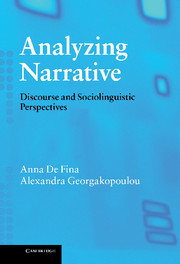Book contents
- Frontmatter
- Contents
- Acknowledgments
- Preface
- Note on transcription conventions
- 1 Narrative definitions, issues and approaches
- 2 Narrative as text and structure
- 3 Narrative and sociocultural variability
- 4 Narrative as interaction
- 5 Narrative power, authority and ownership
- 6 Narrative and identities
- Notes
- References
- Index
4 - Narrative as interaction
Published online by Cambridge University Press: 05 June 2012
- Frontmatter
- Contents
- Acknowledgments
- Preface
- Note on transcription conventions
- 1 Narrative definitions, issues and approaches
- 2 Narrative as text and structure
- 3 Narrative and sociocultural variability
- 4 Narrative as interaction
- 5 Narrative power, authority and ownership
- 6 Narrative and identities
- Notes
- References
- Index
Summary
Introduction
The study of narratives in a wide range of everyday contexts has led researchers to challenge the focus of post-Labovian research on monologic teller-led stories that were recounted to compliant and mostly silent audiences in interviews and instead to emphasize the complexity and variability of storytelling formats, their dependence on the local context of interaction, and the important role played by participant structures in their production and reception. In this chapter, we focus on stories as interactional achievements, and we therefore stress the significance of participation structure and of the conversational work done in the moment-by-moment unfolding of a story’s telling. Our aim is to show how studies of storytelling have gradually moved from tellers to tellership and from story as a product to storytelling as a process. We will discuss ways in which storytellers launch, sustain and end narratives in interaction, and illustrate the role of storytellers and audiences in the unfolding of stories. In particular, we will analyze the kinds of problems that storytelling poses to tellers and audiences, the many ways in which reactions from an audience may affect storytelling, and the variability in roles that can be taken up by participants in a storytelling event.
To this effect, we will engage with research that has unpacked simple notions of teller and audience, demonstrating the existence of much more complex participation frameworks in narrative events. We will also discuss the notion of telling rights as central to an understanding of different participant configurations in specific storytelling contexts. In the second part of the chapter, we will illustrate how looking at storytelling as an interactional phenomenon necessarily leads to a recognition of the variability in storytelling formats. We will therefore discuss different story types that depart from the structure of the prototypical narrative, and we will review small stories research as an attempt to unify efforts at broadening the scope of narrative analysis. As we will see, the questions that form the core of this chapter have been investigated mostly within the domain of conversational narratives. That said, scholars studying elicited narratives have also recognized the need to take into account their interactional characteristics (e.g. Baker and Johnson 2000; Mishler 1986; Riessman 1991) and therefore to problematize the sharp division between conversational and interview stories.
- Type
- Chapter
- Information
- Analyzing NarrativeDiscourse and Sociolinguistic Perspectives, pp. 86 - 124Publisher: Cambridge University PressPrint publication year: 2011
- 1
- Cited by



